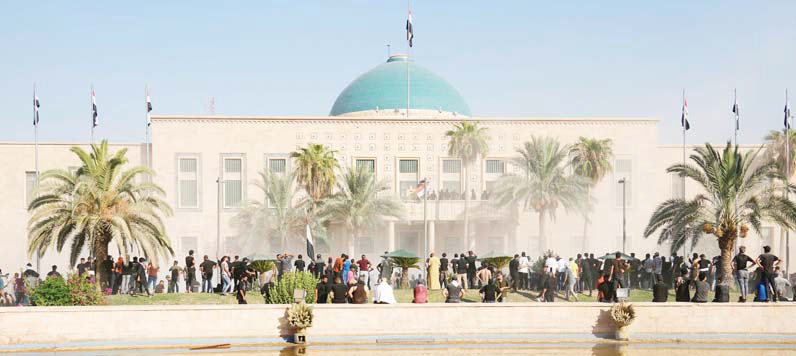29/08/2022
29/08/2022
BAGHDAD, Aug 29 : At least eight people were killed and more than 70 others injured in demonstrations erupted in the Iraqi capital, Baghdad, a security source said Monday. The eight people were shot dead, while the wounded had varied injuries due to shooting, it added, noting that most of the wounded were admitted to a hospital in the capital. Baghdad's Green Zone witnessed fire shooting on many protesters of Sadr Movement and no official body announced who opened fire at the protesters.

An influential Shiite cleric announced Monday he would resign from Iraqi politics, prompting hundreds of his angry followers to storm the government palace and sparking clashes with security forces in which at least five protesters were killed. Protesters loyal to cleric Muqtada al-Sadr pulled down the cement barriers outside the government palace with ropes and breached the palace gates. Many rushed into the lavish salons and marbled halls of the palace, a key meeting place for Iraqi heads of state and foreign dignitaries. Iraq’s military announced a nation-wide curfew and the caretaker premier suspended Cabinet sessions in response to the violence.
Medical officials said at least 15 protesters were wounded by gunfire and a dozen more were injured by tear gas and physical altercations with riot police. Iraq’s government has been deadlocked since al- Sadr’s party won the largest share of seats in October parliamentary elections but not enough to secure a majority government. His refusal to negotiate with his Iran-backed Shiite rivals and subsequent exit from the talks has catapulted the country into political uncertainty and volatility amid intensifying intra-Shiite wrangling. Iraq’s majority Muslim population is split into two sects, Shiites and Sunnis. Under Saddam Hussein, the Shiite were oppressed until the U.S.-led invasion reversed the political order. Now, the Shiites are fighting among themselves, with the dispute centering around power and state resources but also influence over the Shiite street.
To further his political interests al-Sadr has wrapped his rhetoric with a nationalist and reform agenda that resonates powerfully among his broad grassroots base who hail from Iraq’s poorest sectors of society and have historically been shut out from the political system. Many were first followers of his father, a revered figure in Shiite Islam. They are calling for the dissolution of parliament and early elections without the participation of Iran-backed Shiite groups, which they see as responsible for the status quo.
During Monday’s clashes, Saraya Salam, a militia aligned with al-Sadr gathered in the capital’s Tahrir Square to “protect” protesters, one of its commanders said. An Associated Press photographer heard gunshots being fired in the capital and saw several protesters bleeding and being carried away. It was not immediately clear who fired the gunshots. A senior medical official confirmed at least five protesters were killed by gunfire. Protests also broke out in the Shiite-majority southern provinces, with al-Sadr’s supporters burning tires and blocking roads in the oil-rich province of Basra and hundreds demonstrating outside the governorate building in Missan.


